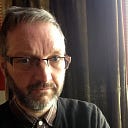Stumbling Along in the Dark
Accidental, agnostic believer looking for someone else with a torch. A Thought for the Day on BBC Radio 4. (Listen here.)
My friend, who lives in a small village, has fallen and broken her shoulder.
She can no longer drive and neither, for the moment, can her partner, after an earlier medical episode.
Oddly though, they describe themselves as lucky … because a WhatsApp group of 17 neighbours is all over them.
Drs appointment? Shopping? Train to catch? Whatever it is, someone replies to say they can help.
My friends are rich in what academics call ‘social capital’ and among the reasons for this is that they have long been a part of a local church.
Every week they join people they might not otherwise have met and discover things they might never have known they had in common.
On paper churches are in a terminal crisis — not being very good at persuading people to join.
Perhaps because they want people to adopt beliefs that can seem difficult to buy into.
The emphasis is on belief rather than practice, on creed over community.
Some people find that a creed they can’t swallow is matched by a rule they can’t follow — like not being able to marry someone of the same sex in a church.
This Spring marks the 1700th anniversary of one of the most influential Christian creeds — The Nicene Creed — created at a meeting of bishops in 325.
It was an attempt to make it clear, once and for all, who was in and who was out. Who was a true believer and who was a heretic.
It wasn’t a dispute about how many angels can dance on the head of a pin, but, looking back, it can seem that way.
There’s a good line in the Oscar-nominated film Conclave, when one Cardinal says to the others, ‘If there was only certainty and no doubt, there would be no mystery. And therefore no need for faith.’
Religions are born in mystery but grow up to demand certainty — while life is often about holding faith and doubt together.
Some of us may find solace or purpose in church or cathedral not through assent to a list of doctrinal statements but because what we really believe in is singing or silence, is company, is lighting a candle in wordless prayer.
A communal rhyme and rhythm in the week. A welcome sabbath from the oppression of the information age.
‘My karma ran over your dogma…’ as someone once put it. Which is to say: who we are is more significant that what we believe.
Many of us are accidental or agnostic believers, stumbling along in the dark, looking for someone else with a torch.
Maybe we’ll find them on a WhatsApp group — or in a local house of prayer.
